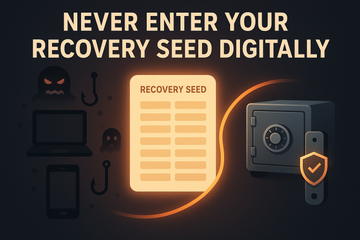So, you're diving into the world of cryptocurrencies, and you're learning everything you can about keeping your assets safe. You might have come across terms like 'recovery seed' or 'seed phrase,' and it's likely you've read something about how crucial it is to keep this information secure. But have you stopped to consider the perils of entering your recovery seed on a computer or phone? Let's break this down—because, trust me, it's important for your digital security.
What Even Is a Recovery Seed?
Here's the scoop: Your recovery seed is a set of words—often 12 to 24—that is generated when you first set up your cryptocurrency wallet. This seed is essentially the magic key to your crypto kingdom; lose it, and you're locked out forever. It sounds simple, but it carries a monumental responsibility.
Mistakes Happen: Typing Your Seed Digitally
Imagine this: You're on your phone or laptop, juggling conversations and working on a document when it hits you, 'Oh, let me just back up my seed phrase real quick.' Sounds convenient, right? Well, hold that thought. Entering your recovery seed on any device connected to the internet is like leaving your front door open in a busy neighborhood. Cybercriminals are always scouting for vulnerabilities, and they have myriad ways of stealing information directly from your gadgets.
The Invisible Threats
You know those pesky updates your device insists upon? Sometimes they patch known vulnerabilities, but if you’ve delayed that update, you could be at risk. Plus, malware and phishing attacks can lurk in the background—waiting for a moment to pounce. Keyloggers, for instance, can secretly record every keystroke you make, including that precious recovery seed.
So, What Should You Do Instead?
Here's a novel idea: Keep it offline. Use paper (I know, retro, right?) or a hardware wallet like Ledger or Trezor, where your seed never touches the digital realm. Consider storing it in a secure, physical location like a safe. It’s your safeguard against the chaos of the cyber world.
Embracing Low-Tech Solutions
You might think, 'But hey, paper can be burnt, lost, or stolen.' True. But compared to the volatility of digital theft, it’s a risk many in the crypto community find worthwhile. It turns out that sometimes, old-school methods are still the most secure.
Hardware Wallets: Worth the Investment
Ledger and Trezor are giants in the land of hardware wallets. These devices store your recovery seed and private keys offline, adding a robust layer of security. They add peace of mind knowing your cryptocurrencies won’t vanish just because you accidentally downloaded an infected application.
Let's Talk about Trust Issues
Do you trust all your apps and software? Maybe, but consider this: Even seemingly legitimate applications can have backdoors that give malicious parties access to your data. So even reputable software isn't immune from exploitation.
The False Sense of Security
Here’s the thing: We’ve all fallen for the apparition of ‘it’ll never happen to me’. But why take chances when there’s so much at stake? The value of Bitcoin or Ethereum isn’t just in their abstract worth; it’s in the hard-earned money you put into them. Taking digital shortcuts is like ignoring a ticking clock—you assume time is on your side until disaster strikes.
Oh, But I'm Careful on My Devices!
Good for you! That’s a fantastic start. Keep those antivirus softwares updated and treat every suspicious email with suspicion. However, remember: it only takes a single overlooked detail or breach for all your security measures to come undone. In the realm of digital currencies, there's seldom room for 'almost secure.'
Wrapping It All Up: The Golden Rule
At the end of the day, if there's something you should take to heart, it's this: Never, ever, under any circumstances, store your recovery seed digitally. Consider it a golden rule. In the ever-evolving dance of cybersecurity, it's better to be on the side of caution.
Now, go backup your recovery seed correctly. Your future self will thank you.











